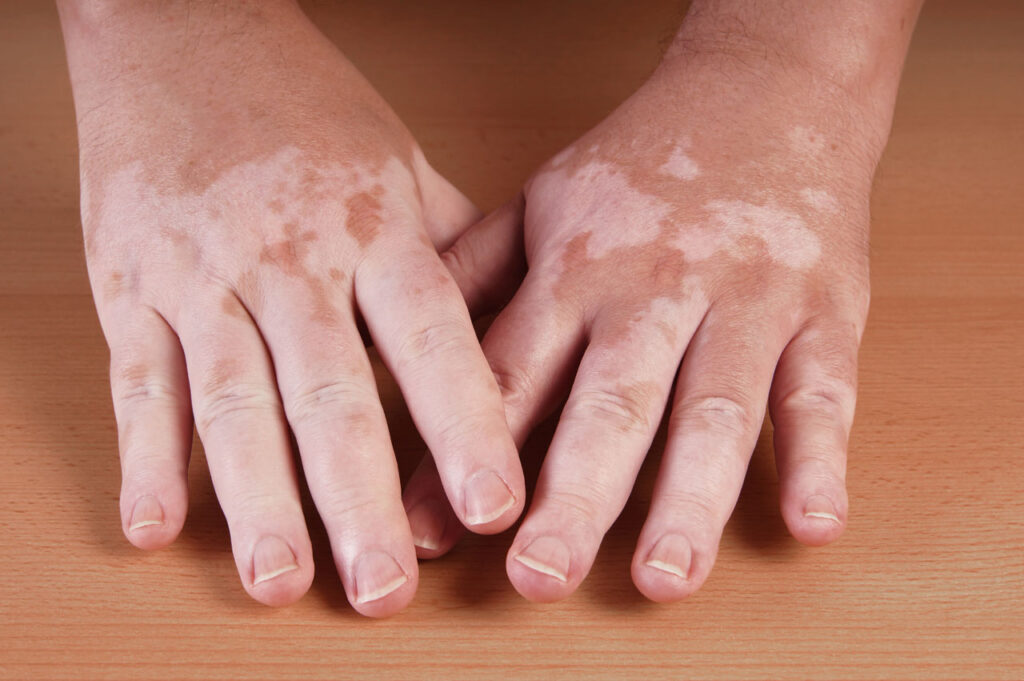
Vitiligo is a skin condition that results from the loss of melanin-producing cells called melanocytes, leading to patches of skin on the body losing pigmentation and becoming lighter than the surrounding skin. Vitiligo can affect individuals of any skin type and may appear on various body parts, including the face, eyes, hair, and oral cavity. Although it can develop at any age, it often emerges before the age of 20. In some cases, the condition may stabilize on its own without requiring treatment. However, for others, it may continue to progress and spread to other areas.
Once the skin loses its color due to vitiligo, it usually cannot naturally return to its original state. Nevertheless, there are treatment options available. Dr. Solomon Brickman, a Board Certified Dermatologist at Houston Laser Skin Center in Northwest Harris County has extensive experience in treating patients with vitiligo.
What causes vitiligo?
Vitiligo is a skin condition that occurs when the melanin-producing cells, known as melanocytes, die or stop producing melanin. Several factors can contribute to the development of vitiligo, including:
- Autoimmune Disease: In some cases, vitiligo is associated with autoimmune disorders. The immune system mistakenly attacks and destroys the melanocytes, leading to a loss of pigment in the affected areas.
- Genetics: Family history plays a role in vitiligo. If you have a close relative with vitiligo or other autoimmune conditions, you may have a higher risk of developing the condition yourself.
- Internal Triggers: Certain internal factors, such as high levels of stress or hormonal changes, have been linked to the onset or progression of vitiligo. While the exact mechanisms are not fully understood, these triggers can contribute to the disruption of melanocyte function.
- External Triggers: External factors can also play a role in the development of vitiligo. Sunburn can potentially trigger vitiligo in individuals who are genetically predisposed to the condition. Additionally, exposure to certain chemicals may contribute to the destruction of melanocytes in some cases.
It’s important to note that the exact cause of vitiligo is not fully understood, and it likely involves a combination of genetic, environmental, and immune-related factors. Currently, there is ongoing scientific researching that aims to develop a better understanding of vitiligo.
If have noticed or have concerns about changes in your skin pigmentation, it’s best to consult Dr. Solomon Brickman for an evaluation.
What are some of the symptoms of vitiligo?
Symptoms of vitiligo can vary but typically include:
- Patchy Loss of Skin Color: The primary and most noticeable symptom of vitiligo is the appearance of patchy areas on the skin that have lost their normal pigmentation. These patches may be more prominent on the hands, face, around body openings (such as the mouth, nose, and genitals), and other body areas.
- Premature Whitening or Graying of Hair: Another common symptom is the early whitening or graying of hair on the scalp, eyebrows, eyelashes, or beard, which occurs due to the loss of melanin in the hair follicles.
- Loss of Color in Mucous Membranes: In some cases, vitiligo may affect the mucous membranes that line the inside of the mouth and nose, leading to a loss of color in these areas.
This condition can manifest in different forms: generalized, segmental, localized, or universal.
- Universal Vitiligo: In this type, the discoloration affects nearly all skin surfaces across the body.
- Generalized Vitiligo: This is the most common type, where discolored patches appear symmetrically on corresponding body parts.
- Segmental Vitiligo: This type tends to occur on only one side or part of the body and often starts at a younger age, progressing for a year or two before stabilizing.
- Localized (Focal) Vitiligo: In this type, vitiligo is limited to one or only a few specific areas of the body.
- Acrofacial Vitiligo: Here, the affected skin is localized on the face, hands, and around body openings like the eyes, nose, and ears.
The progression of vitiligo can be unpredictable. However, Dr. Brickman will explain your outlook to you based upon the form of vitiligo that you have.
Have concerns about your skin pigmentation? Schedule a visit to Houston Laser Skin Center
If you are concerned about recent, extensive discoloration of your skin, please contact Houston Laser Skin Center today. Led by Dr. Solomon Brickman, our Northwest Harris County clinic aims to provide excellent, caring service.
